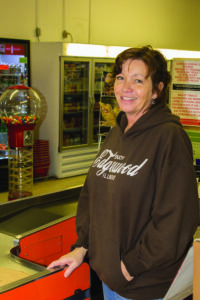Edgewood Store is home away from home
Carla Sowers purchased the 117 year-old Edgewood Store, in Edgewood, Ill., population 434, a little over a year ago through a CEFS Economic Opportunity Corporation (www.cefseoc.org) small business revolving loan program. CEFS is a not-for-profit community action agency that helps assist economically – and socially-disadvantaged people attain greater self-sufficiency in Christian, Clay, Effingham, Fayette, Montgomery, Moultrie and Shelby counties.
The Edgewood Store building was in need of immediate structural repair which Sowers’ sons were able to do. She also had to paint everything and make much needed repairs to the ceiling.
 According to Sowers, “Six months into purchasing the store, I could see that it was just barely going to make it. Everything that came in went right back out.” She started looking for ways to increase her sales. While her fresh meat case and daily lunch specials bring people in, it just isn’t enough. She has added pizzas, movies, hunting and fishing licenses, and is in the process of getting the licensing to put in video gambling machines, all in the hopes of finally earning enough to be able to take a break now and then.
According to Sowers, “Six months into purchasing the store, I could see that it was just barely going to make it. Everything that came in went right back out.” She started looking for ways to increase her sales. While her fresh meat case and daily lunch specials bring people in, it just isn’t enough. She has added pizzas, movies, hunting and fishing licenses, and is in the process of getting the licensing to put in video gambling machines, all in the hopes of finally earning enough to be able to take a break now and then.
Currently, Sowers is at the store about 70 hours a week and usually has the help of one employee. On Sundays, she handles everything herself but it is getting busy enough she may need help then as well.
Sowers says, if she hadn’t already worked for the previous owner, she never would have tried to buy it. She already knew many of the customers and says they are always thanking her for keeping the store open.
“I’ve made a lot of friends,” she says. “They are pretty much like family and some of them even worry about how many hours I’m working, but I tell them I’m fine. I treat everyone that walks in the door like family. This is my home away from home.”
Delivering groceries and unity in Germantown
Glenn and Wanita Gebke purchased Germantown Groceries almost two-and-a-half years ago. Glenn was actually a bag boy at the store when he was growing up. He was in the process of retiring as a correctional officer when he purchased the store, which was preparing to close. Both Glenn and Wanita grew up in Germantown, population 1,294, and that played a part in them buying the store. They say the store helps unite the community because you are regularly talking to customers and you understand the town.
According to Glenn, a lot of elderly residents shop at Germantown Groceries, and they have a variety of regular shoppers from those buying everything they need to those running in for a few basics. Customer service is utmost on their minds. “We even deliver to some of the elderly who can’t get out,” says Wanita. “When we know someone is recovering from an operation we will offer to deliver their groceries. We even have a few regulars who will call and we’ll deliver to them.”
One of the biggest challenges the Gebkes have is keeping up maintenance of outdated equipment, and other capital projects. They recently put new lighting in the refrigeration and freezer units and have 1960s paneling and flooring that needs to be replaced. Their current priority is getting updated registers that will help them track and control inventory.
They cut their own meat and have a variety of fresh fruits and vegetables. And if customers don’t find what they are looking for, all they have to do is ask and they do their best to fulfill the request. Customers continually thank them for their devotion to keeping the store open, and they find the work rewarding. The Gebkes enjoy pleasing customers and the community loves them back. You can hear the hometown pride in their voices as they talk about their community.
“We might not be able to beat some stores on prices,” says Glenn. “But we can beat them on friendliness and hospitality. That’s the hometown feel.”
Citizen-saved store in Washburn
In Washburn, a small 1,150 bedroom community of Peoria, the citizens initiated the Washburn Community Foods Project in 2000 to save its local grocery store. By selling shares they raised $100,000 of seed money needed to keep the local store open.
“There were 360 shareholders when we started, says Tim Schoon, vice president of Washburn Community Bank. “It was local folks and relatives, family and friends of people who lived here that bought the shares. There were a lot of $50 and $500 shareholders and the largest single shareholder was the bank at $10,000.”
According to Schoon, the grocery business has gone through many challenging changes. It’s a high volume, low margin business, and it’s really hard to maintain volume and margin in a small town community where one-third of the people are elderly and don’t have the ability to leave the community to shop.
“You try to do something for those people, maintain property values and sustain whatever business you can in a rural atmosphere,” says Schoon.
Through the efforts of the community, the group was able to sustain the store for the past 13 years. From the first day, the store operated with volunteers and was managed by a board of 16 directors. Volunteers helped unload the trucks, mark items and stock the shelves. Anytime there was a special need for extra people it was done with volunteers. They hired a manager and a couple of employees to help customers.
Profit was always an issue – they continued to stock the shelves, but when it came to capital improvements the community had to raise funds through a variety of charity auctions, golf outings, etc. In 2005, the group decided to convert the store to a co-op. Original shareholders converted to co-op membership and contributed money each year for a discount on their groceries. That gave the store a regular influx of cash.
But the Washburn Community Foods building needed too many capital upgrades – things were wearing out. The store started cutting down on the inventory, but as inventory declined, so did sales and they were caught in a Catch 22 situation.
In the end, it was just too much. The board decided it was time to give someone else a fresh start with their own ideas. They found a private owner who had a few other stores and was willing to take on the store. They signed over ownership in late summer of 2013.
For those communities looking for ways to hold onto their grocery store, Schoon says, “You need a strong sense of community pride and leadership with everyone coming together for a common cause. And, it is ongoing, not a onetime thing. If you don’t have the community commitment and the people commitment, it’s probably not viable.”
Finding the secrets to success at Windsor Foods
As you drive east on Route 16 through the small town of Windsor, population 1,180, you will come across Windsor Foods owned and managed by Bob Peadro. He is a lifelong resident of Windsor and has a long background in the grocery business, beginning when he was young and sacked groceries at a store in nearby Sullivan. After being drafted in the Army, Peadro returned to his grocery roots and, in 1988, purchased the business.
The original 5,000-square-foot store was a block off of the highway, but three years ago Peadro built the existing store and business has tripled. “I didn’t expect that,” says Peadro, “but I’m pleased!”
The new building has 12,600 square feet and new energy efficient refrigeration. The old store had 16 refrigeration/freezer cases, each with its own compressor. The units in the new store have a total of just four compressors, and he has seen his utility bill go down even though they have a much larger space.
Peadro says, “In a small grocery store you have to find a niche. There are no restaurants in town so we put in tables and booths for customers. Now when they pick up a hot breakfast or one of our popular lunch specials they have a place to sit.” They do a brisk business with area residents and those traveling through on their way to work.
The meat department, run by son Daric, is their strongest department. “You can go anywhere and buy groceries, but you can’t buy the burger patties or other meats he has,” explains Peadro.
Daric has come up with 33 varieties of burgers, either pork-, beef- or chicken-based and customers come from as far away as Bloomington, Decatur and Champaign. He also came up with his own barbeque sauce, Daric’s Original Smoke Shack BBQ Sauce, which is so popular it is now bottled and labeled for them by Country Bobs. It is only available at Windsor Foods.
The secret of his success, Peadro says, is customer service. He learned it from his “hero” Elsworth Lehman, a name well-known to those in the area. Lehman owned and operated the IGA in Sullivan for many years and Peadro was impressed from a young age with how Lehman knew the names of his customers and was sure they had a good shopping experience. He has carried that customer service over to his own store.
“I’m not strictly about dollars and cents,” says Peadro. “You can go anywhere and sack your own groceries, and probably buy them cheaper than you can here, but our customer service is great. The little things haven’t changed, we still sack them and carry them out.”
When was the last time your supermarket did that for you?
Building a business on bratwurst

Stepping into Jones Boys Market in Ashland is a bit like stepping back into time. The fourth-generation meat market has roots back to the 1800s, when it was a dry goods store. Original fixtures are still part of the ambience of the store along with its brick walls and uneven floor.
Current owners and operators, John and Beth Jones, along with son Dan, have expanded their offerings and gone into local farmers markets in Springfield and Decatur.
Known for their many varieties of bratwurst, customers flock to their booth at the Illinois Products Farmer’s Market on the Illinois State Fairgrounds and to the Richland Community College Farmers Market in Decatur. Once the farmer’s markets are over for the season they see an influx of folks from out of town who stop into the store to stock up.
They offer personal service, cutting your meat to order, and have more than 40 different varieties of bratwurst from their most popular Apple Brats to Dill Pickle, Chicken Bacon Ranch and up to 32 of which you can find in their freezer, depending on the season.
Dan says, “We have seen a boost in business in the last four to six years as people are looking for local food and have become more interested in where it is coming from and what is being put into it. We use no preservatives and although not organic, it is all natural. We tell people they need to use the brats within six to eight weeks because they aren’t full of preservatives. But that also brings them back to buy more.” Everything they sell is USDA approved, as is required to be a retail outlet.
Jones Boys Market has always sold its meat to local restaurants and is hoping to expand into even more farmer’s markets including the one at the Peoria Riverfront. Find out more on the Jones Boys Market Facebook page.










